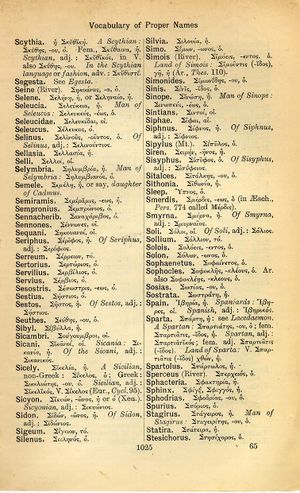Sicyon: Difference between revisions
(Names) |
(6_15) |
||
| Line 3: | Line 3: | ||
<b class="b2">Sicyonian</b>, adj.: Σικυώνιος. | <b class="b2">Sicyonian</b>, adj.: Σικυώνιος. | ||
}} | |||
{{Lewis | |||
|lshtext=<b>Sĭcyon</b>: ōnis (abl. e, [[rarely]] i), f. ([[but]]<br /><b>I</b> masc. Cic. Att. 1, 13, 1), = Σικυών, the [[capital]] of the [[territory]] of Sicyonia in the [[Peloponnesus]] ([[now]] Vasiliko), [[near]] the [[isthmus]], [[sometimes]] considered as belonging to [[Achaia]], abounding in [[olive]]-trees, the birthplace of [[Aratus]], Mel. 2, 3, 10; Plin. 4, 5, 6, § 12; Cic. Off. 2, 23, 81; id. Fam. 13, 21; id. Att. 1, 13, 1; Ov. Ib. 315; id. P. 4, 15, 10; Plaut. Curc. 3, 25; id. Merc. 3, 4, 62 al.—Abl. Sicyoni, Plaut. Cist. 1, 3, 8; 1, 3, 42; id. Ps. 4, 2, 38; and Sicyone, id. Cist. 1, 2, 11; id. Ps. 4, 7, 80; Cic. Fam. 13, 21, 1 and 2.—Hence, Sĭcyōnĭus, a, um, adj., of or belonging to [[Sicyon]], Sicyonian: [[ager]], Liv. 33, 15: [[magistratus]], Cic. Verr. 2, 1, 17, § 44: [[Aratus]], id. Off. 2, 23, 81: calcei, a lcind of [[soft]] shoes, id. de Or. 1, 54, 231: [[baca]], olives, Verg. G. 2, 519: [[ager]], Liv. 43, 15.—As substt.<br /> <b>1</b> Sĭ-cyōnĭi, ōrum, m., the inhabitants of [[Sicyon]], the Sicyonians, Cic. Tusc. 3, 22, 53; id. Att. 1, 19, 9; 1, 20, 4; 2, 1, 10 al.—<br /> <b>2</b> Sĭcyōnĭa, ōrum, n., Sicyonian shoes, Lucil. ap. Fest. s. h. v. p. 337 Müll.; Lucr. 4, 1125; Verg. Cir. 168; Auct. Her. 4, 3, 4. | |||
}} | }} | ||
Revision as of 09:06, 13 August 2017
English > Greek (Woodhouse)
Σικυών, -ῶνος, ἡ or ὁ (Xen.).
Sicyonian, adj.: Σικυώνιος.
Latin > English (Lewis & Short)
Sĭcyon: ōnis (abl. e, rarely i), f. (but
I masc. Cic. Att. 1, 13, 1), = Σικυών, the capital of the territory of Sicyonia in the Peloponnesus (now Vasiliko), near the isthmus, sometimes considered as belonging to Achaia, abounding in olive-trees, the birthplace of Aratus, Mel. 2, 3, 10; Plin. 4, 5, 6, § 12; Cic. Off. 2, 23, 81; id. Fam. 13, 21; id. Att. 1, 13, 1; Ov. Ib. 315; id. P. 4, 15, 10; Plaut. Curc. 3, 25; id. Merc. 3, 4, 62 al.—Abl. Sicyoni, Plaut. Cist. 1, 3, 8; 1, 3, 42; id. Ps. 4, 2, 38; and Sicyone, id. Cist. 1, 2, 11; id. Ps. 4, 7, 80; Cic. Fam. 13, 21, 1 and 2.—Hence, Sĭcyōnĭus, a, um, adj., of or belonging to Sicyon, Sicyonian: ager, Liv. 33, 15: magistratus, Cic. Verr. 2, 1, 17, § 44: Aratus, id. Off. 2, 23, 81: calcei, a lcind of soft shoes, id. de Or. 1, 54, 231: baca, olives, Verg. G. 2, 519: ager, Liv. 43, 15.—As substt.
1 Sĭ-cyōnĭi, ōrum, m., the inhabitants of Sicyon, the Sicyonians, Cic. Tusc. 3, 22, 53; id. Att. 1, 19, 9; 1, 20, 4; 2, 1, 10 al.—
2 Sĭcyōnĭa, ōrum, n., Sicyonian shoes, Lucil. ap. Fest. s. h. v. p. 337 Müll.; Lucr. 4, 1125; Verg. Cir. 168; Auct. Her. 4, 3, 4.

